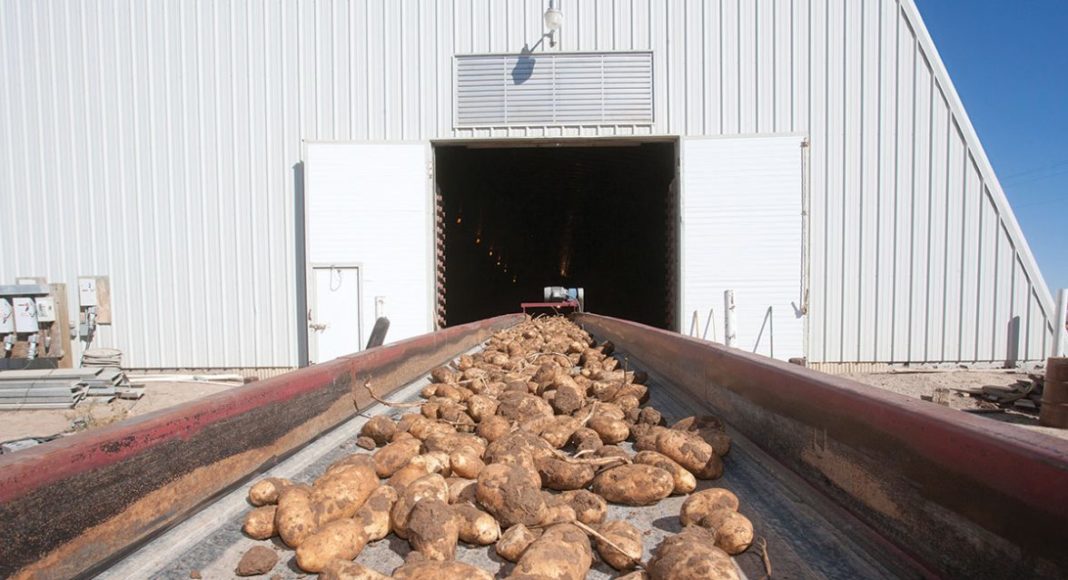[deck]February figures show a decline in storage holdings from the same time last year, leading to upward pressure on potato prices.[/deck]
TOTAL POTATO storage holdings in Canada were down eight per cent on Feb. 1 from a year previously, according to the United Potato Growers of Canada (UPGC).
Storage holdings were down in every province except for British Columbia, where holdings were up substantially at 24 per cent. Kevin MacIsaac, UPGC general manager, says an exceptional 2016 crop in B.C. meant more potatoes than usual were put in storage following harvest.
Of those provinces with reductions in storage numbers, Ontario led the way with a decline close to 30 per cent, followed by New Brunswick with a drop in storage holdings of almost 20 per cent. Drought conditions in Ontario last summer led to a leaner crop and fewer potatoes in the storage bins.

“This is actually reverting back to more of a normal trend,” he says. “As I look back at the three previous years, storage holdings are fairly close to where we would be.”
MacIsaac notes healthy demand for table stock potatoes has been keeping packers busy. “All areas are reporting good demand for their product, and sheds have been pretty busy packing for the last month or so.
“We’re down 11.8 per cent for potatoes that are available for the table market versus what was available a year ago, so that means that some areas will finish up sooner or clean up a little earlier than they had expected,” he says.
Demand has also been good on the processing side and not just due to exports benefitting from the low Canadian dollar — sales of frozen potato products have been brisk here in Canada.
“Plants are running hard and they will continue to run hard. There’s been some extra business that’s been generated this year and processing plants will need to work hard to meet that customer need,” MacIsaac says.
Storage holdings for seed potatoes were actually up eight per cent from the previous year. MacIsaac says that’s largely due to a very good seed crop in Alberta, one of Canada’s largest seed-producing regions.
“They had a really nice crop of seed in the northern part of the province where a lot of their seed is grown,” he says. “Definitely there is some increased opportunity to move that seed from Alberta into the U.S. There are some processing plant expansions there that have been announced in the past year and there will be some additional seed needed for those expansions.”
MacIsaac says the storage situation for fresh and processing potatoes has meant good prices, and he feels upward pricing pressure will likely continue heading into spring, which is of course is great news for growers.
“Most areas are reporting better pricing than last year,” he notes. “There are probably four provinces that now realize they are going to run out a little sooner than they had expected and they’re going to work to raise that price upwards. I think they should definitely be able to do that, based on the supply we have available.”
Higher prices means improved profitability for potato farmers. In some provinces, a grower return index (GRI) is used to measure profitability for potato producers. Growers in P.E.I. indicated in early February their GRI was $2.80 above what it was a year previously, providing a good indication producers were doing pretty well in terms of pricing.
The quality of stored potatoes in February continued to be good as well.
IT’S A DIFFERENT storage picture south of the border. Figures released by the United States Department of Agriculture (USDA) in mid-February showed storage holdings were up three per cent from the same time the previous year.
The 13 major potato states held 204 million hundredweight of potatoes in storage on Feb. 1, 2016, according to the USDA figures. Potatoes in storage accounted for 50 per cent of the 2016 production by the fall storage states, the same as last year.
IT WILL BE interesting to see how many potato acres are planted in Canada in 2017, given developments with a number of other crops. MacIsaac notes that in the U.S., the potato acreage is expected to go up slightly because of reduced price points for some rotation crops like corn, wheat and barley which make growing spuds more attractive.
“Those crops are not favourable in terms of pricing this year compared to where they were, say, two years ago,” he says.
“I would say there are some similar things happening in Canada. We are in a profitable year for potatoes and I would say there is probably less profitability in some of the other rotation crops than there has been in the past, so I don’t see any movement [in potato acreage] downward,” MacIsaac adds.
“There has also been some processing expansions announced for Canada, specifically in Alberta. There will be potatoes needed to supply that. Not right away until the plant is built and up and running, but certainly it will be needed as we go along.”
As a result of these developments, MacIsaac is anticipating Canada’s potato acreage will rise a bit in 2017.











